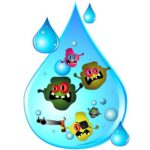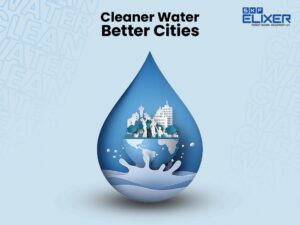Table of Contents
The monsoon season often brings an increase in waterborne diseases due to flooding, water stagnation, and compromised water quality. Here’s how these diseases occur, their prevention, and a look at how water quality, including hard water, affects health:
Good reads are meant to be shared
Causes of Waterborne Diseases:
- Contaminated Water Sources: Flooding can mix sewage or agricultural runoff with drinking water sources.
- Inadequate Sanitation: Poor sanitation practices can lead to the spread of pathogens in water.
- Water Treatment Failures: Overburdened or damaged water treatment systems during heavy rains can fail to purify water adequately.
Common Waterborne Diseases During Monsoons:
- Cholera: Caused by Vibrio cholerae, leading to severe diarrhea and dehydration.
- Typhoid: Salmonella typhi infection, resulting in high fever, weakness, and stomach pain.
- Hepatitis A: A liver infection from the hepatitis A virus, spread through contaminated food or water.
- Dysentery: Often caused by bacteria like Shigella or parasites, leading to bloody diarrhea.
- Giardiasis: Giardia parasites causing diarrhea, gas, and stomach cramps.


How Can We Prevent Water Borne Diseases?
- Boil Water: Boil water for at least one minute to kill pathogens.
- Water Purification: Use methods like:
- Chlorination: Add chlorine tablets or bleach to disinfect water.
- Filtration: Employ water filters that can remove bacteria, viruses, and parasites.
- UV Treatment: UV light can disinfect clear water efficiently.
- Safe Storage: Use clean, covered containers for storing water to prevent recontamination.
- Hygiene Practices: Regular hand washing, especially before handling food or eating, reduces the spread of germs.
- Avoid Raw Foods: During monsoons, avoid raw or uncooked foods unless you’re sure they’re from safe sources.
Hard Water and Hair Loss:
- Can Hard Water Cause Hair Loss?:
- While hard water doesn’t directly cause hair loss, it can lead to hair becoming dry, brittle, and dull due to mineral buildup, potentially exacerbating hair thinning or loss if combined with other factors.
- Can Water Cause Hair Loss?: Indirectly, if the water contains high levels of contaminants or if hard water leads to scalp conditions like dandruff or psoriasis, these might contribute to hair loss.
Hard Water Solutions for Home:
- Water Softening Systems: Install a water softener to reduce calcium and magnesium ions, which improve water quality for hair, skin, and appliances.
- Shower Filters: These can remove some minerals from the water you use for bathing, reducing the impact on hair.
- Use of Conditioners: Regular use of conditioning products can counteract the drying effects of hard water on hair.


FAQs:
Q1: What is the primary cause of waterborne disease during monsoons?
A: Contamination from flooding and poor sanitation leading to pathogen spread.
Q2: How to prevent water borne diseases at home?
A: Boil, filter, or chemically treat water, and maintain good hygiene practices.
Q3: Can hard water solutions for home really make a difference?
A: Yes, they can significantly improve water quality, benefiting hair, skin, and reducing scale in appliances.
Q4: Is consuming pure water the only way to prevent waterborne diseases?
A: While crucial, combining safe water consumption with hygiene and food safety practices is most effective.
Q5: Should I be concerned about hair loss if I have hard water?
A: If you notice hair issues, consider hard water as a potential factor and explore water treatment options.
By ensuring access to pure water and understanding the implications of water quality on health, one can significantly reduce the risk of waterborne diseases and mitigate issues like those related to hard water during the monsoon season.
College campuses often draw water from municipal sources or local wells, both of which can carry contaminants. For instance, hard water—rich in calcium and magnesium—can gradually damage pipes and appliances over time. Meanwhile, bacteria, viruses, or chemical pollutants like lead and nitrates might lurk undetected, thereby posing serious health risks.
Without proper water treatment systems, both staff and students could face health issues, such as gastrointestinal infections or long-term exposure to toxins. Additionally, campus infrastructure may suffer from scaling and corrosion if hard water treatment solutions are neglected. Therefore, investing in a water purifier for drinking water in college is not just a convenience but a necessity.
Good reads are meant to be shared




